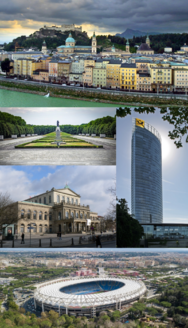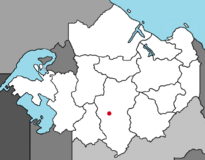Melmingen: Difference between revisions
Jump to navigation
Jump to search
Neuleinster (talk | contribs) No edit summary |
Neuleinster (talk | contribs) No edit summary |
||
| (14 intermediate revisions by the same user not shown) | |||
| Line 1: | Line 1: | ||
{{Infobox settlement | {{Infobox settlement | ||
| name = | | name = Melmingen | ||
| native_name = | | native_name = | ||
| native_name_lang = <!-- ISO 639-2 code e.g. "fr" for French. If more than one, use {{lang}} instead --> | | native_name_lang = <!-- ISO 639-2 code e.g. "fr" for French. If more than one, use {{lang}} instead --> | ||
| settlement_type = | | settlement_type = | ||
| image_skyline = | | image_skyline = [[File:Melmingen2.png|188px]] | ||
| image size = 155px | |||
| image_alt = | | image_alt = | ||
| image_caption = | | image_caption = From top down, left to right: Old town with Garnsurg Castle, Headquarters of the [[Besmenische Bundespost]], [[Melmingen Olympic Stadium ]], State Opera of Melmingen, West Besmenian Memorial | ||
| image_flag = Flag of Melmingia.jpg | | image_flag = Flag of Melmingia.jpg | ||
| flag_alt = | | flag_alt = | ||
| Line 15: | Line 15: | ||
| shield_alt = | | shield_alt = | ||
| etymology = | | etymology = | ||
| nickname = | | nickname = | ||
| motto = | | motto = | ||
| image_map = Location of | | image_map = [[File:Location of Melmingennew.png|205px]] | ||
| map size = 155px | |||
| map_alt = | | map_alt = | ||
| map_caption = | | map_caption = | ||
| Line 30: | Line 31: | ||
| subdivision_name = [[Besmenia]] | | subdivision_name = [[Besmenia]] | ||
| subdivision_type1 = State | | subdivision_type1 = State | ||
| subdivision_name1 = [[ | | subdivision_name1 = [[Maurenmark]] | ||
| subdivision_type2 = District | | subdivision_type2 = District | ||
| subdivision_name2 = {{Collapsible list | | subdivision_name2 = {{Collapsible list | ||
| Line 45: | Line 46: | ||
| subdivision_name3 = | | subdivision_name3 = | ||
| established_title = | | established_title = | ||
| established_date = | | established_date = 1323 | ||
| founder = | | founder = | ||
| seat_type = | | seat_type = | ||
| Line 56: | Line 57: | ||
| leader_name = [[Herbert Hof]] ([[Besmenian People's Party|BVP]]) | | leader_name = [[Herbert Hof]] ([[Besmenian People's Party|BVP]]) | ||
| leader_title1 = Governing parties | | leader_title1 = Governing parties | ||
| leader_name1 = [[Besmenian People's Party|BVP]] / [[Social Democratic Union|SDU]] | | leader_name1 = [[Besmenian People's Party|BVP]] / [[Social Democratic Union (Besmenia)|SDU]] | ||
| leader_title2 = | | leader_title2 = | ||
| leader_name2 = | | leader_name2 = | ||
| Line 100: | Line 101: | ||
| elevation_m = | | elevation_m = | ||
| population_footnotes = | | population_footnotes = | ||
| population_as_of = | | population_as_of = 2022 | ||
| population_total = | | population_total = 2680654 | ||
| population_density_km2 = auto | | population_density_km2 = auto | ||
| population_note = | | population_note = | ||
| Line 118: | Line 119: | ||
| footnotes = | | footnotes = | ||
}} | }} | ||
'''Melmingen''' is the state capital of the Besmenian state of [[Maurenmark]]. With 2,680,654 inhabitants (2022), it is the most populous city in Maurenmark and the second largest city in Besmenia after [[Laitstadt]]. Melmingen is counted among the world cities and is considered a center of culture, politics and media. | |||
Founded in the 12th century, Melmingen became the capital of the [[Kingdom of Besmenia]] in 1821, the capital of the [[Besmenian Empire]] in 1927 and the capital of the [[Besmenian Republic]] in 1966. With the [[Besmenian reunification]] in September 1967, Melmingen became part of the Federal Republic. | |||
==History== | |||
==Demographics== | |||
==Geography== | |||
===Climate=== | |||
==Politics== | |||
==Economy== | |||
==Transport== | |||
==Culture== | |||
==International Relations== | |||
[[Category: Besmenia]] | [[Category: Besmenia]] | ||
Latest revision as of 15:36, 25 February 2023
Melmingen | |
|---|---|
 From top down, left to right: Old town with Garnsurg Castle, Headquarters of the Besmenische Bundespost, Melmingen Olympic Stadium , State Opera of Melmingen, West Besmenian Memorial | |
 | |
| Country | Besmenia |
| State | Maurenmark |
| District | Districts
|
| Government | |
| • Body | City Council |
| • Mayor | Herbert Hof (BVP) |
| • Governing parties | BVP / SDU |
| Population (2022) | |
| • Total | 2,680,654 |
Melmingen is the state capital of the Besmenian state of Maurenmark. With 2,680,654 inhabitants (2022), it is the most populous city in Maurenmark and the second largest city in Besmenia after Laitstadt. Melmingen is counted among the world cities and is considered a center of culture, politics and media.
Founded in the 12th century, Melmingen became the capital of the Kingdom of Besmenia in 1821, the capital of the Besmenian Empire in 1927 and the capital of the Besmenian Republic in 1966. With the Besmenian reunification in September 1967, Melmingen became part of the Federal Republic.
